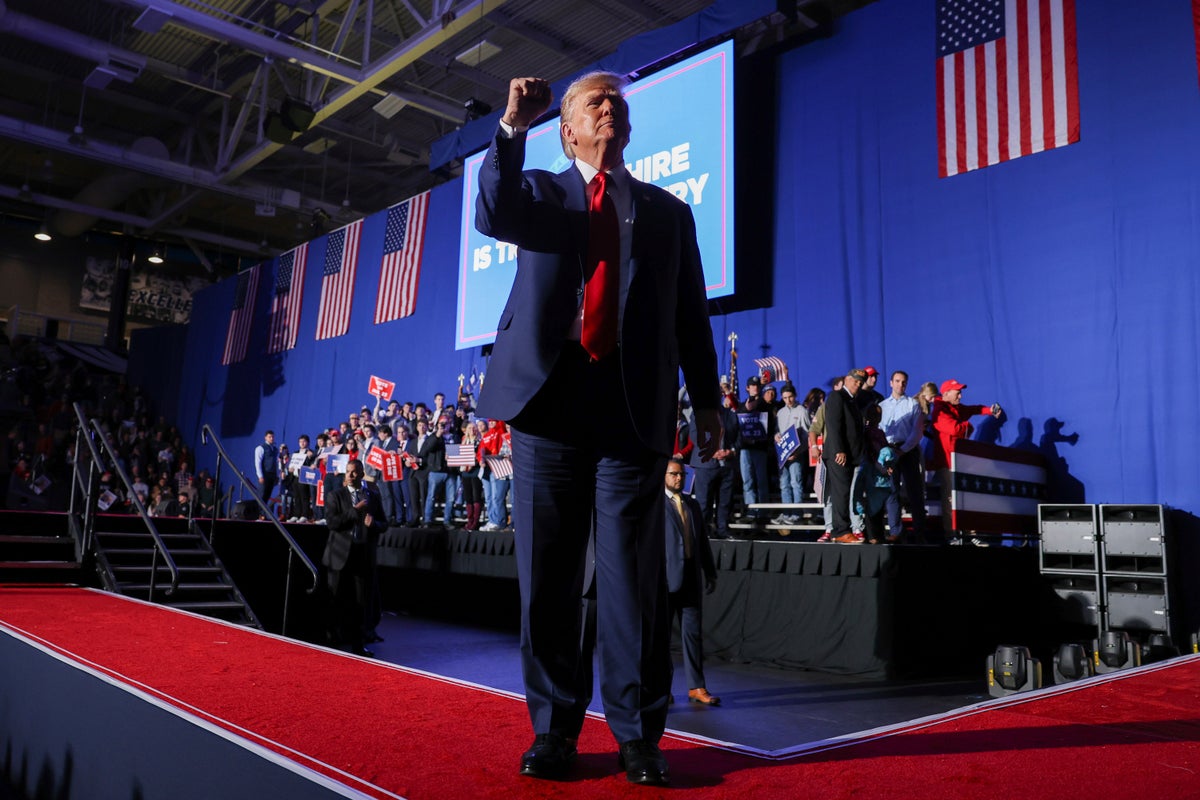
Donald Trump continues to channel “blood and soil” rhetoric at rallies and in interviews as he campaigns for the Republican nomination for president in 2024.
While outlining his anti-immigration agenda during a campaign rally in New Hampshire on Saturday, the former president claimed that immigrants from South America, Africa and Asia are coming from “mental institutions and prisons all over the world” and are now “poisoning the blood of country”.
“They’re poisoning the blood of the country. That’s what they’ve done,” he said. “They poison mental institutions and prisons all over the world. Not just in South America. Not just the three or four countries we think about. But all over the world they’re coming into our country, from Africa, from Asia.”
Despite a lack of evidence to support his inflammatory statements, the leading candidate for the 2024 Republican nomination continues to revive them, drawing comparisons to the words of Adolf Hitler and statements fuelling white supremacist attacks.
His latest speech echoed statements from a September interview with right-wing media outlet The National Pulse, where he claimed that migrants who seek asylum in the US “come from prisons … mental institutions and insane asylums”.
“We know they’re terrorists. Nobody has ever seen anything like we’re witnessing right now. It is a very sad thing for our country. It’s poisoning the blood of our country,” he said.
The comments have been roundly condemned as a warning of his increasingly violent and authoritarian rhetoric, echoing Mein Kampf’s creeds against the “contamination of the blood” and “the poison which has invaded the national body” from an “influx of foreign blood”.
Neo-fascist groups chanted “blood and soil” at a violent rally in Charlottesville, Virginia in 2017, and the words have fuelled the so-called “great replacement” conspiracy theory behind white supremacist groups, racist mass shootings and far-right media commentary.
“There is no word-mincing here: Trump is calling for a white ethno-nationalist state that will lead to mass violence and the end of America’s aspiring multiracial democracy and America itself,” wrote Janai Nelson, president and director-counsel of the NAACP Legal Defense & Educational Fund.
“No matter where you are on the political spectrum, this is deeply dangerous rhetoric,” she added.
MSNBC commentator Mehdi Hassan noted Mr Trump’s latest remarks are “classic Trump.”
“[S]ay something crazy outrageous, neo-Nazi-like and it gets headlines, creates outrage,” he added. “So wait a little. Then say it again, no one notices, no coverage, and it gets normalized and mainstreamed. Let’s be clear: migrants ‘poisoning the blood’ is Hitler rhetoric.”
His speech in New Hampshire also returned to his promise of “ideologically screening” immigrants entering the US.
Legal analysts and authoritarianism scholars told The Independent that his statements, which reliably overwhelm social media and seep into the language of his supporters, are giving them permission to dehumanise and degrade his political opponents as he does, priming their acceptance of political “retribution” against the “other” side, while absolving them of responsibility for it.
At his New Hampshire rally, Mr Trump called defendants charged in connection with January 6 “hostages,” days after federal prosecutors warned that they intend to use his endorsement of their alleged actions in a sprawling criminal case against him.
Mr Trump has offered financial support and pledged to pardon people convicted on charges connected to the attack on the US Capitol, when a mob fuelled by his own false narrative of election fraud broke into the halls of Congress to block Joe Biden’s presidency.
He has embraced the “January 6 Choir”, a group of defendants who remain in a Washington DC jail for crimes that, according to federal prosecutors, “were so violent that their pretrial release would pose a danger to the public”.
According to a recent filing from US Department of Justice special counsel Jack Smith, his team is relying on his well-documented support for rioters as evidence in the election conspiracy case to argue that he knew what would happen if he failed to stop the mob from breaching the Capitol to stop the certification of 2020 results.
Mr Trump’s speech in New Hampshire, his first in the state in more than a month, comes just weeks before primary ballots are cast in the first-in-the-nation Republican primary election.







